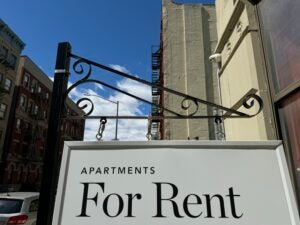20% of aspiring homeowners think they’ll never save enough to buy. Can rent-to-own help?




With today’s high mortgage rates and home prices, coming up with enough money for a down payment is difficult for many potential buyers. In fact, 81 percent of Americans who would like to buy a house say closing costs and down payments are a “very significant” or “somewhat significant” hurdle to owning a home some day, according to Bankrate’s 2025 Home Affordability Report.
These affordability challenges mean many are looking for alternative ways to become homeowners. One potential answer is rent-to-own homes, which allow tenants to put some of their monthly rent payments toward the eventual purchase of the property. But can renting-to-own help you afford a home purchase? Here’s what hopeful homebuyers should know.
How does rent-to-own work?
This kind of housing setup gives renters the option to work toward buying the home they already live in. In many arrangements, some of your monthly rent payment gets applied toward the final purchase price. In effect, you’re building up part of your eventual down payment through your rent checks.
“With rent-to-own, you start out as a tenant but end up as an owner, renting the home for a period of time with the option to buy it at a later point in the lease period,” says Greg McBride, Bankrate’s chief financial analyst.
With rent-to-own, you start out as a tenant but end up as an owner.— Greg McBride, CFA, chief financial analyst for Bankrate
A typical rent-to-own arrangement has two parts: the rental lease agreement and the purchase option.
The lease agreement portion is much like any other lease: It stipulates that you pay a set amount of rent on a regular basis while you live in and use the home, and it sets conditions around that, such as what you can and can’t do to the property.
The purchase option gives you the right to buy the home, either during or at the end of your lease. The option spells out how the home’s price will be determined if and when you decide to purchase it (for instance, will it be set at the beginning of the lease or closer to expiration?) and how your rent payments may apply toward the purchase (if at all).
You might need to pay an upfront fee to have this option included in the overall agreement — the option fee typically ranges from 1 percent to 5 percent of the total purchase price. And if a portion of your rent is being applied, called a rent credit, the designated percentage will be held escrow to be applied to your down payment later.
Example
For example, let’s say you enter a two-year rent-to-own agreement. The option fee is 5 percent of the home’s $150,000 purchase price, or $7,500. You’ll pay that amount upfront, and your monthly rent will be $1,500. Twenty percent of the rent ($300 per month) will go into an escrow account during the two years of your lease. When it comes time to purchase, you’ll subtract the $7,500 option fee and $7,200 in rent credits ($300 over 24 months), which reduces the purchase price by $14,700, to $135,300. At that point, you can finance the purchase by getting a mortgage, just like any other homebuyer.
Ideal rent-to-own candidates
The rent-to-own method can be especially useful if you have a low credit score and need some time to build it up, or want time to pay down your debt so you can qualify for better mortgage terms when the time is right.
Rent-to-own is best for a prospective homebuyer who might not be ready, or get approved, to buy a home at the current time.— Greg McBride, CFA, chief financial analyst for Bankrate
“Rent-to-own is best for a prospective homebuyer who might not be ready, or get approved, to buy a home at the current time due to credit issues, lack of savings or uneven income,” says McBride. “You use the lease period to take steps toward homeownership and getting approved for the mortgage needed to ultimately purchase the home.”
Currently, 18 percent of Americans say renting is cheaper than owning a home, according to Bankrate’s Home Affordability Report. While for many this adds to the headwinds of buying a home, if you can rent-to-own, you may get the best of both worlds.
Renting to own can be a good option for people who want to buy a house but are financially unable to at the moment. It’s best for those who:
- Plan to stay put for awhile
- Don’t quite have enough for a down payment right now but are working their way toward it
- Have a credit score that’s too low to qualify for a mortgage currently
- Are able to afford a larger monthly rent than they may pay elsewhere
What happens after I move in?
Once you’ve decided to move forward with a rent-to-own property, you move into your home as a renter. But, depending on your agreement, you may have to follow different rules than a typical renter.
Be sure to familiarize yourself with your contract. State laws vary on rent-to-own contracts: Some agreements may designate the tenant to be in charge of managing repairs and maintenance, as an owner would. In addition, make sure you understand the penalties of a late or missed payment — in some cases, this could be grounds for the owner to terminate your contract.
Lease-option vs. lease-purchase
Rent-to-own contracts come in two basic kinds: lease-option and lease-purchase agreements. “A lease option gives you the option to buy the home at a specific point in the future, whereas the lease purchase obligates you to buy the home at that future point,” says McBride. Whether you choose to purchase or are contractually required to, make sure you start working to secure a mortgage well in advance.
How does a lease-option agreement work?
When you sign a lease-option agreement, you pay an option fee to the homeowner so you can buy the home at the end of your lease term. The lease will spell out what (if any) portion of the lease option or rent payment will go toward the purchase price. Remember, you can negotiate the option amount and monthly rent payments ahead of time. In most cases, your option fee goes toward reducing the purchase price of the property.
You’ll pay rent during your lease period, and a portion of that rent money typically goes toward your down payment once you decide to buy the home. You’ll work with the seller to agree on a purchase price after your lease expires.
This is an ideal option if you’re not absolutely sure in the beginning whether you want to buy, because you can always choose to walk away. But the downside is that you’ll lose the option fee and your rent credit if you don’t go through with the purchase.
How does a lease-purchase agreement work?
A lease-purchase agreement is very similar, in that you still put a certain percentage of your rent payments toward a down payment to buy the home. One difference is that you and the seller agree to a purchase price ahead of time. You can both agree to a price before you sign a lease agreement, or specify a date for a home appraisal and decide on a price after the appraisal is completed.
Keep in mind: Lease-purchase agreements require you to buy the home at the end of your lease term, whereas lease-option agreements do not.
Another crucial difference: When you enter a lease-purchase agreement, you are contractually obligated to buy the home at the end of the lease. It’s a good idea to make sure you’ll qualify for a loan during your lease period, because you’ll give up your claim to the home and all of the rent credit you’ve accumulated if you fail to qualify for a mortgage at the end of the lease. The homeowner can also potentially sue you for breach of contract if you don’t buy the home.
Rent-to-own tips
If you are interested in renting-to-own, these tips can help:
Get legal representation to review the contract before signing. Rent-to-own may work out just as you intended, but you also risk losing a chunk of money.— Greg McBride, CFA, chief financial analyst for Bankrate
- Choose the best terms for your situation. Be sure to weigh the pros and cons of both a lease-option and lease-purchase arrangement. If you’re not sure whether you’ll want to buy the home, a lease-option might be the better choice.
- Consult with a real estate attorney. “Get legal representation to review the contract before signing,” says McBride. “Rent-to-own may work out just as you intended, but you also risk losing a chunk of money — such as the option fee and monthly rent credits — if your plans later change.”
- Read everything thoroughly. Make sure all dates, deadlines and financial amounts are clear to both parties. This includes logistics, such as what appliances come with the sale and who performs and pays for repairs and maintenance during the lease period. Learn about how to exercise your intent to buy, as well as pet policies, property taxes and possible homeowners association fees.
- Get a home inspection. Have a home inspector check out the home before you agree to the purchase price, and see if the owner will agree to pay for the inspection. An inspector can identify any major flaws with a home that will be costly to repair later on, and also protect you against claims for damage if you don’t buy.
Pros and cons
Rent-to-own homes have both benefits and drawbacks for potential buyers.

Pros
- Rent-to-own can provide you with a path to homeownership if you can’t immediately qualify for a mortgage.
- If you fall in love with a specific home on the market, rent-to-own ensures no one else can purchase it.
- It can help you try out a new neighborhood before committing to a purchase.
- It can cut down on the cost and hassle of moving multiple times.

Cons
- You will usually have to pay a premium rent rate instead of a market rate (because it includes the rent-credit money put toward your ultimate purchase).
- You may have to pay fees that you won’t get back if you decide not to buy.
- If you don’t ultimately qualify for a mortgage, you’ll lose the money you spent on the option and potentially the rent credit as well.
- The home could lose value over the lease period.
Where to find rent-to-own homes
Rent-to-own opportunities are not as common as traditional rentals or sales, but they are out there. A real estate agent may be able to help you find options — there may even be agents in your area who specialize in rent-to-own properties. Your best bet might be to use a rent-to-own company to find properties with owners looking specifically for tenant-buyers, such as one of these:
- Rent to Own Labs: This company compiles listings from all over the country that are available for rent-to-own agreements. You can search by area, and each listing compiles the key stats about the property and its location.
- RenttoOwn.org: RenttoOwn.org is another site to find listings advertising rent-to-own agreements. Other than rent-to-own, it also shows homes in foreclosure, at auction and that have an owner financing option.
- Divvy Homes: Similarly, Divvy helps you look for a home. If you qualify for the program, they purchase the home you choose and set aside a portion of your rent to put toward your eventual purchase. They aim to help you qualify for a mortgage within three years.
FAQs
Additional reporting by Emma Woodward
Why we ask for feedback Your feedback helps us improve our content and services. It takes less than a minute to complete.
Your responses are anonymous and will only be used for improving our website.
You may also like

Could renting be part of the new American dream?



